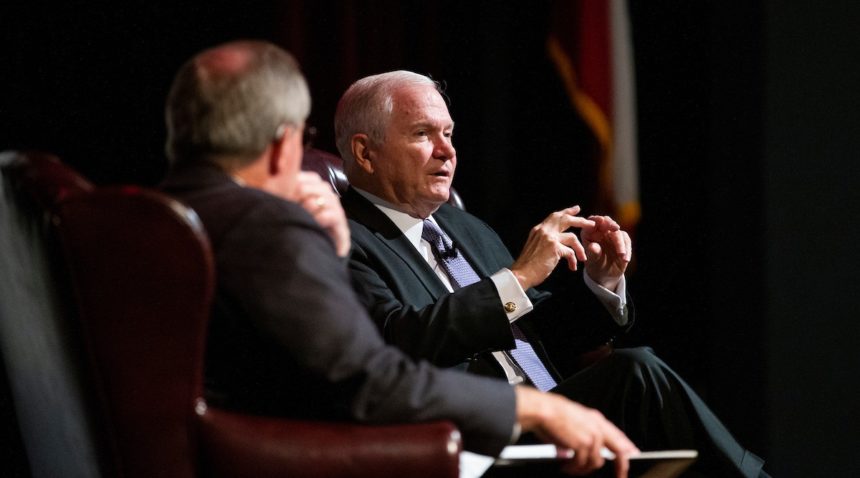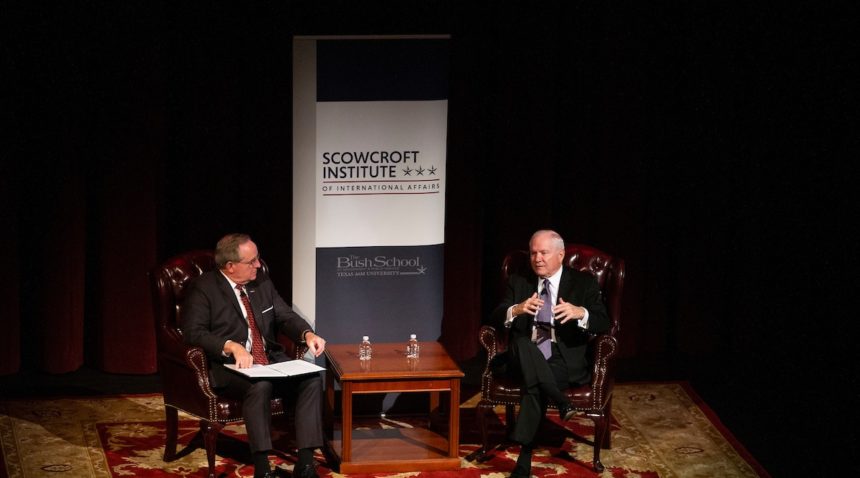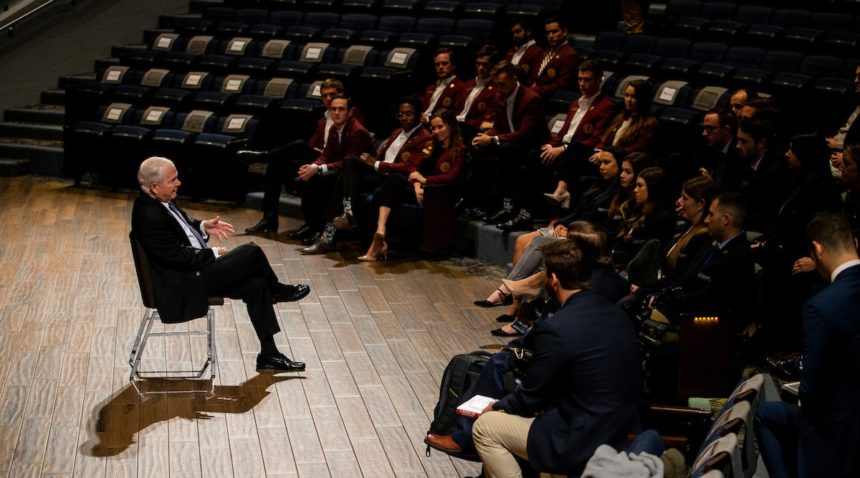Gates: Unity Necessary To Solve Nation’s Problems



The years Robert Gates spent as president of Texas A&M University, he said Wednesday during a talk at Rudder Theatre, were “the most fun” he’s ever had.
That time from 2002-2006 was preceded by a career in public service that started in 1966 at the Central Intelligence Agency, where he served as director from 1991-1993, and as assistant to the president and deputy national security adviser at the White House from 1989-1991 under President George H.W. Bush. In his first visit to College Station since Bush’s death last December, Gates reflected on his career and offered insights on issues facing the United States.
Gates’ visit was hosted by the Scowcroft Institute of International Affairs at the Bush School of Government and Public Service, and was moderated by Bush School Dean Mark Welsh. During the wide-ranging discussion, Gates repeatedly voiced concerns about the current political division in the United States.
“I think that the greatest threat to the national security of the United States right now can be found within the two square miles that encompass the Capitol building and the White House,” Gates said. “And I don’t mean that facetiously. If we can’t figure out a way to come together and begin to address some of the nation’s really big problems, that’s a bigger threat to us in the future than Russia or China.”
Speaking on the day of the first public hearing of the impeachment inquiry into President Donald Trump, Gates said he understands the desire to hold the president accountable — “I personally think that, at a minimum, what happened with Ukraine was dishonorable,” he said — but questioned the cost of doing so.
“I’m kind of hard-pressed to figure out what the right path forward is, but I do know what the consequences are going to be, and that is further polarization and distraction, and not getting the peoples’ business done,” Gates said.
Gates said he also had concerns about a partisan impeachment process, especially one a year before the 2020 presidential election. And when asked by Welsh for his thoughts on the issues 2020 candidates have so far focused on, Gates said the Democrats have put forth political “pipe dreams” rather than proposals that deal with the “actual problems we have.”
“I don’t hear any of the candidates talking about the importance of bringing Americans together, about how we begin to repair the division among us, how we begin to deal with the reality that we’re all in this together and we’re going to have to work together to make progress in this country and overcome a lot of these problems,” Gates said.
He also pointed to what he views as a lack of foreign policy proposals from the candidates. Gates served as secretary of defense from 2006-2011 under Presidents George W. Bush and Barack Obama, making him the only person in U.S. history to be asked to remain in that office by a newly-elected president. Gates said his top policy concern is the United States’ relationship with China.
China sees itself as a global power competitive with the United States in every arena, he said, and the authoritarian state capitalism seen under Chinese President Xi Jinping has offered an alternative path to develop for other governments. The relationship with China has to be peaceful, Gates said, and competition will take place in non-military arenas. And while China has a strategy, the U.S. doesn’t, he said.
“The challenge will be keeping that relationship competitive and not completely adversarial and possibly resulting in military confrontation,” he said.
Gates stressed the importance of rebuilding the United States’ non-military capabilities and cultivating relationships with allies.
Russia is also seeking to restore the great power status it had before the collapse of the Soviet Union, Gates said, and Vladimir Putin “will do everything he can in his power to create political problems in the West.” Gates said to expect a continued effort on the part of Russia to divide the U.S.
Reflecting on his time at Texas A&M, Gates said his role was similar to other positions he’s held as a leader seeking to balance the traditions and culture “that are at the heart and soul” of an organization that can have “a deep resistance to change” while also moving forward. He also served as interim dean of the Bush School from 1999 to 2001.
Gates described the 41st president as a “genuinely warm, decent human being.”
“Here’s this man who held all these powerful positions, but one of the things that was most marked about him was how kind he was and how he treated everybody with respect and dignity,” Gates said. “And he cared as much and asked as much about the families of the groundskeepers and the housekeepers in the White House as he did of his cabinet officers.”
Gates currently is a partner in the consulting firm RiceHadleyGates LLC, along with former Secretary of State Condoleezza Rice and former National Security Advisor Stephen Hadley.
Media contact: Caitlin Clark, 979-458-8412, caitlinclark@tamu.edu.




